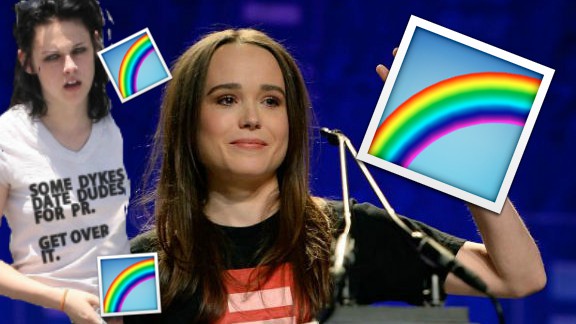A Reflection on Coming Out Day and Respecting Choices
By Matilda Douglas-Henry
Yesterday was National Coming Out day – a misleading title, considering it’s actually a global awareness day that originated in the United States in 1998. I don’t think I’d ever seen such an enthusiastic response to October 11 until yesterday. In particular, people were using social media as a platform for coming out. Whether they were already openly queer and using yesterday as a conduit for positive affirmations, or were actually coming out for the first time, my Facebook feed was full of beautiful stories. I saw haikus, meme-driven posts, and succinct, poignant declarations of people’s queerness. Whatever form it came in, it was a beautiful time.
I got to thinking about my own coming out story – how, because of my privilege of growing up with two mums, queerness was never an outlandish possibility for me. It was part of my day-to-day life. While I coasted through most of my teenage years thinking I was straight (although many relationships with women during this time proved otherwise) I had always known that whatever sexuality I identified with, I would be supported. As a result, I don’t really have a coming out story. I just dated whoever I wanted to, and my parents – the disturbingly perceptive people they are – always cottoned on.
It was both empowering and heartbreaking to consider how some of the coming out posts I was so moved by yesterday would be interpreted by these people’s family members. Perhaps they would simply comment with a love heart emoji, or an “I’m proud of you”. Maybe they would call them, crying, and tell them that they love them no matter what. But I also had to think about the more negative responses – the disappointment, the tears, the anger. Unfortunately, coming out is not a validating process for everyone.
Coming out is a really exciting feeling. It is so wonderful to express who you are – to have that oppressive weight lifted off your chest, and to be open and proud. Yet the process is nuanced, and does not mean simply sitting your parents down and telling them you’re gay. When the facets of queerness are more embraced than ever (at least in my community), it’s becoming progressively more difficult to tell an obfuscated coming out narrative to an older generation; one does not just fall in to a lesbian, gay, or bisexual category.
When you’re still trying to figure out what queerness means on your own terms, it can be incredibly hard to succinctly articulate that to your family. For trans or gender non-conforming people in particular, having to justify who you are can be a traumatising and harrowing experience. Advocating for someone to come out runs the risk of neglecting intersectionality – a lack of consideration for someone’s cultural background and family history.
Especially if you already have a queer network who love and support you, is it worth it?
The pressure to embrace coming out stems largely from popular culture and our society’s intense fascination with celebrity. I have certainly judged people who aren’t out in the public eye when they’re ‘obviously’ queer (what does that even mean, anyway?). I was frustrated by how long it took for Kristen Stewart to announce she had a girlfriend – naively interpreting her hesitance to announce her sexuality to the world as taciturn embarrassment. I have also felt incredibly strong and empowered. I literally wept with pride when Ellen Page came out in 2014, and every time a queer Orange is the New Black cast member posts something really gay on Instagram I am united with them. Nevertheless, there shouldn’t be pressure for every queer person in the world to declare their sexuality.
Privilege is pervasive. While queer communities are essential and inform who we are, it is also crucial to consider that each person has a different context that influences them. If you think coming out is an essential part of your queer identity, that is fantastic! But we also need to look out for each other, and respect each other’s space and privacy. We can offer support and advice to our chosen rainbow family, but our purpose is not to dictate the decisions they make.

